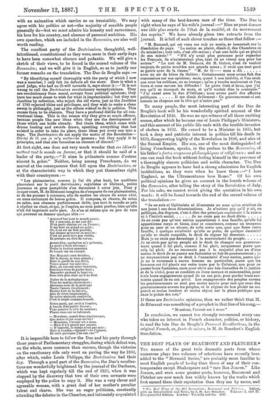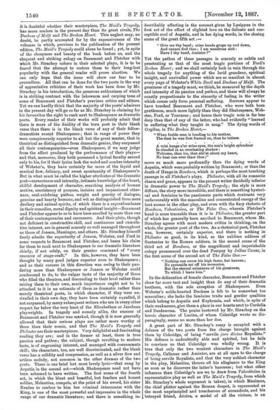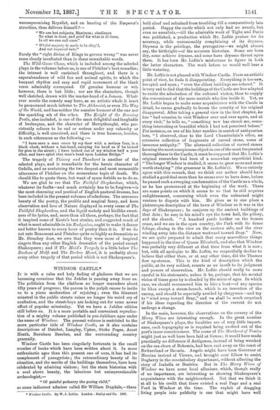THE BEST PLAYS OF BEAUMONT AND FLETCHER.* TIIE names of
the great twin dramatic poets from whose numerous plays two volumes of selections have recently been added to the "Mermaid Series," are probably more familiar to most English people of to-day than those of any of their con- temporaries except Shakespeare and "rare Ben Jenson." Like Jonson, and even some greater poets, however, Beaumont anfl. Fletcher are now much less widely known by the works which first earned them their reputation than they are by name, and • The Best Plays of the Old Dramatists, Beaumont and Fletcher. Edited, with an Introduction nod Notes, by J. St. LOO Strachey. Volumes I. and II. Unexpurgated Edition. London Vizetelly and Co. 1907. it is doubtful whether their masterpiece, The Maid's Tragedy, has more readers in the present day than its great rivals, The Duchess of Ma/fl and The Broken Heart. This neglect may, no doubt, be partly accounted for by the expensiveness of the volumes in which, previous to the publication of the present edition, The Maid's Tragedy could alone be found ; yet, in spite of the cheapness and beauty of the book before us, and the eloquent and striking eulogy on Beaumont and Fletcher with which Mr. Strachey ushers in their selected plays, it is to be feared that the attempt to restore them to their long-lost popularity with the general reader will prove abortive. We can only hope that the issue will show our fear to be groundless. All that can be done for the two poets in the way of appreciative criticism of their work has been done by Mr. Strachey in his introduction, the generous enthusiasm of which is in striking contrast with the lukewarm and carping tone of some of Beaumont and Fletcher's previous critics and editors. Yet we can hardly think that the majority of the poets' admirers in the present day will go so far as Mr. Strachey in claiming for his favourites the right to rank next to Shakespeare as dramatic poets. Every reader of their works will probably admit that there is more of the fluidity of the born poet in their blank verse than there is in the blank verse of any of their fellow- dramatists except Shakespeare ; that in range of power they were conspicuously superior to all but the great master, that in theatrical as distinguished from dramatic genius, they surpassed all their contemporaries—even Shakespeare, if we may judge from the effect produced by the performance of their plays— and that, moreover, they both possessed a lyrical faculty second only to his, for if their lyrics lack the weird and sombre intensity of Webster's, they have certainly far more of the liquid and musical flow, delicacy, and sweet spontaneity of Shakespeare's. But in what must be called the higher attributes of the dramatic poet—earnestness and intensity, intimate knowledge of the heart, skilful development of character, searching analysis of human motive, consistency of purpose, incisive and impassioned utter- ance, soul-subduing pathos, weight and gravity of dialogue, genuine and hearty humour, and wit as distinguished from mere drollery and animal spirits, of which there is a superabundance in their comedies, moral dignity and spiritual insight—Beaumont and Fletcher appear to ns to have been excelled by more than one of their contemporaries and successors. And their plots, though not deficient in constructive skill, and continuous and cumula- tive interest, are in general scarcely so well managed throughout as those of Jonson, 3fitssioger, and others. Mr. Strachey himself freely admits the superiority of jonson, Webster, and Ford in some respects to Beaumont and Fletcher, and bases his claim for them to rank next to Shakespeare in our dramatic literature chiefly, if not solely, on their greater command of "every
resource of stage-craft." In this, however, they have been thought by many good judges superior even to Shakespeare ; and as their success in this direction was owing to their pan- dering more than Shakespeare or Jenson or Webster could condescend to do, to the vulgar taste of the majority of those who filled the theatres, and descending to their level rather than raising them to their own, much importance ought not to be attached to it in an estimate of them as dramatic rather than merely theatrical poets, in which character, if they were un- rivalled in their own day, they have been certainly equalled, if not surpassed, by many subsequent writers who are in every other respect far below the very least of the Elizabethan or Jacobean playwrights. In tragedy and comedy alike, the success of Beaumont and Fletcher was marked, though it is now generally allowed that their serious plays are rather more worthy of them than their comic, and that The Maid's Tragedy and Fiji/aster are their masterpieces. Very delightful and fascinating reading they are; and in the former at least, there is tame passion and pathos ; the subject, though revolting to modern taste, is of engrossing interest, and managed with consummate skill ; the characters, too, are well discriminated, and the blank verse has a solidity and compression, as well as a silver flow and artless melody, not common in the other dramas of the two poets. There is one brief but most lovely lyric—that sung by Aspatia in the second act—which Shakespeare need not have been ashamed to have written. The first scene of the fourth act, in which the blunt and boastful, but fearless and honest soldier, Melantins, compels, at the point of his sword, his sister Evadne to confess to him her criminal intercourse with the King, is one of the most powerful and impressive in the whole range of our dramatic literature; and there is something in- describably affecting in the acconnt given by Lysippus in the first act of the effect of slighted love on the delicate and sus- ceptible soul of Aspatia, and in her dying words, in the closing scene of the great fifth act :—
" Give me thy hand; mine hands grope up and down, And cannot find thee; I am wondrous sick : Have I thy hand, Amintor r
Yet the pathos of these passages is scarcely so subtle and penetrating as that of the most tragic portions of Ford's Broken Heart ; and we shall certainly look in vain through the whole tragedy for anything of the lurid grandeur, spiritual insight, and unrivalled power which are so manifest in almost every page of Webster's White Devil and Duchess of Heft. The greatness of a tragedy must, we think, be measured by the depth and intensity of its passion and pathos, and these will always be exactly proportionate to the sincerity of feeling in the writer which comes only from personal suffering. Sorrows appear to have touched Beaumont and Fletcher, who were both born gentlemen, much more lightly than they did Shakespeare, Web- ster, Ford, or Tourneur ; and hence their tragic note is far less deep than that of any of the latter, who had evidently "learned in suffering what they taught in song." The dying words of 0 rgilus, in The Broken Heart,—
" When feeble man is bending to his mother,
The dust he was first framed on, thus he totters.
. . . . . . . . . . . A mist hangs o'er mine eyes, the sun's bright splendour Is clouded in an everlasting shadow :
Welcome, thou ice, that sited shoat my heart, No heat can ever thaw thee;" move us much more profoundly than the dying words of Aspatia, which were probably written by Beaumont; or than the death of Hengo in Bonduca, which is perhaps the most touching passage in all Fletcher's plays. Phi/aster, with all its romantic charm and grace, appears to the present writer decidedly inferior in dramatic power to The Maid's Tragedy ; the style is more diffuse, the story more incredible, and there is something hysteri- cal and feminine in the passionate parts which &ultimata very unfavourably with the masculine and concentrated energy of the best scenes in the other play, and even with the fiery rhetoric of Bonduca, Valentinian, or The False One, wherein Fletcher's hand is more traceable than it is in Phi/aster, the greater part of which has generally been ascribed to Beaumont, whom Mr. Strachey agrees with most modern critics in thinking, on the whole, the greater poet of the two. As a rhetorical poet, Fletcher was, however, certainly superior, and there is nothing in Phi/aster so good, in its kind, as the sublime address of Suetonitts to the Roman soldiers, in the second scene of the third act of Bonduca, or the magnificent and imperishable eulogy pronounced over the dead Pompey by Julius Csar, in the first scene of the second act of The raise One
Nothing can cover his high fame, but heaven; No pyramids set off his memories, But the eternal substance of his greatness, To which I leave him."
In the delineation of female character, Beaumont and Fletcher show far more tact and insight than do any of their dramatic brethren, with the sole exception of Shakespeare. Even Webster's noble-hearted Duchess is felt to be somewhat too masculine ; she lacks the feminine traits and gentler qualities which belong to Aspatia and Eaphrazia, and which, in spite of their weaknesses, give them a place in our hearts next to Cordelia and Desdemona. The praise bestowed by Mr. Strachey on the heroic character of Lucius, of whom Coleridge wrote so dis- paragingly, seems no more than her due.
A great part of Mr. Strachey's essay is occupied with a defence of the two poets from the charge brought against them by Coleridge, of being "servile jure divine Royalists." His defence is undoubtedly able and spirited, but he fails to convince us that Coleridge was wholly wrong. It is true that only the two weakest characters in The Maid's Tragedy, Calianax and Arainter, are at all open to the charge of being servile Royalists, and that the very noblest character in the play, Melantins, throws off his allegiance to the Xing as soon as he discovers the latter's baseness ; but what other infezenca than Coleridge's are we to draw from Valentinian (a representative play as well as The Maid's Tragedy, from which Mr. Strachey's whole argument is taken), in which Maximus, the chief plotter against the Roman despot, is represented as the most unprincipled and treacherous of scoundrels, and his betrayed friend, Aeolus, a model of all the virtues, is an
uncompromising Royalist, and on hearing of the Emperor's atrocities, thus delivers himself I- " We are bat subjects, Maximus; obedience To what is done, and grief for what is ill done, Is all wo can call ours."
" Whilst majesty is made to be obey'd, And not inquired into."
Surely the "right divine of Kings to govern wrong" was never more clearly inculcated than in these remarkable words.
The Wild.Goose Chase, which is included among the selected plays in the volumes before us, is one of Fletcher's best comedies; the interest is well sustained throughout, and there is a superabundance of wild fun and animal spirits, to which the buoyant rhythm and easy and rapid movement of the blank verse admirably correspond. Of genuine humour or wit, however, there is but little ; nor are the characters, though well sketched, drawn with the master-hand of a Jenson. What- ever merits the comedy may have, as an artistic whole it Must be pronounced much inferior to The Alchemist, or even The Way of the World, and has neither the massive humour of the one nor the sparkling wit of the other. The Knight of the Burning Pestle, also included, is one of the most delightful and laughable • of burlesques, and the character of Merrythought, who per- sistently refuses to be sad or serious under any calamity or difficulty, is well conceived, and there is true humour, besides, in such utterances as the following "I have men a man come by my door with a serious face, in a black cloak, without a bat-band, carrying his head as if be looked for pins in the street ; I have looked out of my window half a year after, and have spied that man's head upon London Bridge."
The tragedy of Thierry and Theodoret is another of the selected plays, and is remarkable for the heroic character of Ordella, and as containing the two deepest and most memorable utterances of Fletcher on the momentous topic of death. We should like to quote them, but want of space forbids us to do so.
We are glad to eee that The Faithful Shepherdess, which, whatever its faults—and much certainly has to be forgiven—is the most charming and poetical of English pastoral dramas, has been included in the present volumes of selections. The sensuous beauty of the poetry, the prolific and magical fancy, and keen observation and love of Nature displayed in every scene of The Faithful Shepherdess, and the liquid melody and birdlike sweet- ness of its lyrics, and, more than all these, perhaps, the fact that it inspired some of Keats's best strains, and suggested much of what is most admirable in his Endymion, ought to make it dearer and better known to every lover of poetry than it is. If we do not rate Beaumont and Fletcher quite so highly as dramatists as Mr. Strachey does, we own that they were more of inspired singers than any other English dramatist of the period except Shakespeare ; and if The Maid's Tragedy is a little below The Duchess of Malfi and The Broken Heart, it is probably above every other tragedy of that period which is not Shakespeare's.


































 Previous page
Previous page